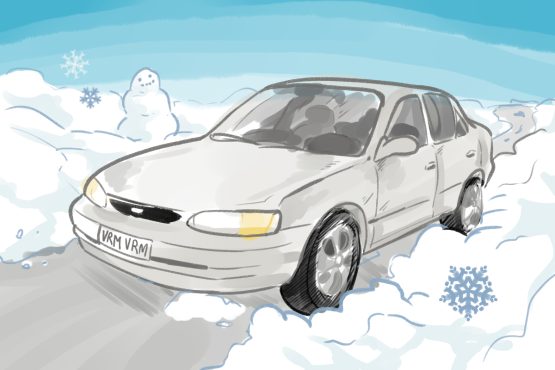As Victoria enters the winter season, here’s some helpful driving tips for precarious weather conditions

Illustration by Sie Douglas-Fish.
With Victoria experiencing snow before cities like Toronto, Ottawa, and Montreal this fall, it might be that time of year again where everyone forgets how to drive as soon as the temperature dips below zero.
As a former commuter to university during Ontario’s cold, winter months, I may have some helpful advice to impart on UVic drivers as we creep into the winter season.
Invest in the right equipment
Nothing is scarier than your car sliding around on icy and snowy roads! Investing in good winter tires can be a lifesaver (literally) and improves your vehicle’s traction for any weather that winter throws your way. Relying on all-seasons or summer tires is not a risk worth taking when it comes to icy conditions. Since new tires can be a huge expense, it is worth checking out the many local tire shops in Victoria that sell good used winter tires. Used tires can still provide a safe performance even on a student budget.
Don’t be caught without a snow and ice scraper — I like to keep mine in the trunk of my car for easy access. Cleaning your windows, mirrors, roof, and lights is critical to keep your vision unobstructed and mind at ease when navigating weather conditions on the road.
Make sure your windshield washer system works and that it contains anti-icing fluid. This can make a huge difference after your car’s windshield is hit with the grit and salt from other vehicles and your visibility becomes impaired as a result. It’s also important to check your windshield wipers as they often wear out faster in cold weather and snowy conditions.
Also, treat yourself to a nice pair of sunglasses! Snow that’s falling and sticking to the ground can cause a lot of squinting and take a toll on the eyes. Sunglasses help avoid any vision impairment caused during snow storms and eye strain that may follow.
Take your time
Give yourself more time than usual to get to your destination. You may think nothing’s worse than dragging yourself outside into the cold on an early morning when you could have spent a few more moments curled up in the warmth of your bed, but it’s always better to leave yourself with some extra travel time to avoid the temptation to shorten your commute by rushing when you’re behind the wheel.
Lack of grip can occur even on well-treated roads so drive slowly, leave lots of room between you and the car in front of you, maneuver gently, take slow turns, and avoid harsh braking.
Create a safety kit
If you have an emergency car kit, remember to restock it. And if you don’t, I highly suggest investing in one. Some winter essentials may include emergency snacks, and water, flashlights, reflective equipment, extra antifreeze, a blanket, a small shovel, and a first-aid kit. Being prepared for any situation can be helpful and lifesaving for any future scenario you find yourself in, whether it be for your own benefit or to help a stranger in need of assistance.
Let someone know
It’s always a good idea to confide in someone you know, whether it’s a family member, friend, or roommate, where you’re headed and when you expect to arrive. A buddy system is a good way to make sure that all parties feel more comfortable when taking a riskier journey on winter roads, especially as it continues to get darker earlier and hazards become heightened due to the limited visibility. Don’t forget to send that “I got home safe” text so everyone can breathe a sigh of relief!






